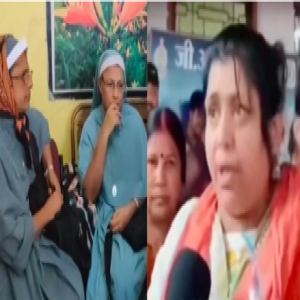
.png) Robert Clements
Robert Clements
.png)
It stings, doesn't it?
To be mocked on the world stage.
To have a foreign leader—not exactly known for consistency or tact—toss our economic efforts aside with a sneer, label us a "dead economy," and then, while we bend over backwards to accommodate his whims, leave us humiliated in front of the world.
We fume.
We rage.
We demand respect.
We say we're not a "lesser people."
And yet…
While we take to global platforms to thump our chests and roar our greatness, back home in a quiet police station in Chhattisgarh, a woman named Jyoti Sharma walks in with all the arrogance of someone who knows she won't be touched. Not by the law. Not by conscience. Not by the spineless protectors of the law who stood watching as she slapped pastors, shoved girls, abused nuns, and even raised an axe at a woman of the cloth.
Yes, an axe.
And no, it's not a metaphor.
The court previously had declared her an absconder.
But instead of the police pouncing on her and presenting her before the judiciary—as any civilised democracy should expect—they watched. They watched as she broke every legal and human code. They watched as she raged through the station like she owned it. And when the dust settled, it wasn't Jyoti Sharma in jail. It was the nuns. The pastors. The believers.
So I ask you: what does it really mean to be a "lesser people"?
Is it just about how another nation treats us? Or is it also about how we treat our own?
Because the truth is, in India today, a Christian who sings a hymn may be treated worse than a mobster who breaks a skull. A nun offering shelter is seen as more dangerous than a political thug with blood on his hands. And people like Jyoti Sharma? They become bold. Brazen. Emboldened by silence and applause in equal measure.
We Indians talk a lot about karma.
But isn't what we're seeing on the world stage a bit of our own karma playing out?
Isn't our silence in the face of injustice at home echoing across international borders?
You can't demand dignity abroad while denying it at home.
You can't cry foul when you're mocked globally while rewarding thuggery locally.
And you most definitely can't speak of "Sabka Saath, Sabka Vikas" when one section of your population feels like they're carrying crosses not just of faith, but of persecution.
I don't believe in karma, but I do believe in justice.
And I believe that when a nation starts to rot internally, the world can smell it.
So maybe, before we run to China—yes, China, who killed our soldiers, helped shoot down our planes and is the friend of our enemy—for validation, maybe we should ask: what kind of nation do we want to be?
One where criminals are protected, pastors thrashed, and nuns jailed?
Or one where even our enemies see us upholding justice?
Jyoti Sharma may have escaped the law today.
But we, the people, have a choice.
To stay silent…
Or to show the world that we are truly not a lesser people.
By treating every Indian as an equal citizen.
Even after a mistake.
Even in disagreement.
Even if they wear a cross.
That, my friends, is how a great nation behaves…